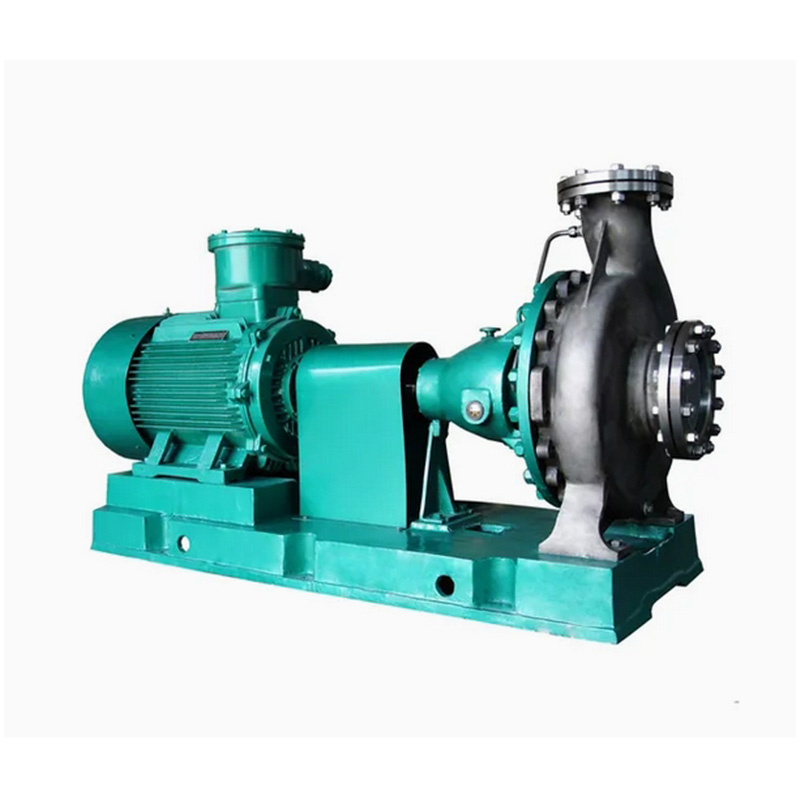IH Type Horizontal Chemical Centrifugal Pump
Cat:Chemical Process Pump
The IH type chemical centrifugal pump is a single-stage single-suction (axial suction) cantilever centrifugal pump, which is used to transport liquids...
See DetailsIn chemical processing industries, precise handling of liquids and corrosive fluids is crucial for operational efficiency and safety. One of the most vital pieces of equipment in this sector is the chemical process pump. But what makes chemical process pumps different from standard pumps, and why are they indispensable in modern industrial operations? This article explores the design, function, benefits, and applications of chemical process pumps and explains why choosing the right pump can make a significant difference in production and safety.
What Is a Chemical Process Pump?
A chemical process pump is a type of pump specifically designed to handle corrosive, abrasive, or high-temperature fluids commonly found in chemical, petrochemical, pharmaceutical, and food processing industries. Unlike standard pumps, these pumps are constructed from corrosion-resistant materials such as stainless steel, Hastelloy, titanium, or specialized plastics. Their design ensures safe, efficient, and continuous transfer of chemicals without risk of contamination or equipment failure.
Chemical process pumps can be centrifugal or positive displacement types, each suited for different applications. Centrifugal pumps are ideal for high-flow, low-viscosity fluids, while positive displacement pumps excel with high-viscosity or shear-sensitive liquids.
How Do Chemical Process Pumps Work?
The operation of a chemical process pump depends on its type and design, but the general principles involve moving liquid from one location to another while maintaining flow and pressure requirements:
Centrifugal Pumps
Liquid enters the pump impeller at the eye, where rotational energy is applied.
The impeller accelerates the fluid outward, converting kinetic energy into pressure, which pushes the liquid through the discharge pipe.

Positive Displacement Pumps
The pump traps a fixed volume of fluid and moves it through the pump chamber.
Examples include gear pumps, diaphragm pumps, and peristaltic pumps.
These pumps maintain a consistent flow regardless of system pressure, making them ideal for precise dosing or handling viscous chemicals.
In both cases, the pump must be carefully engineered to resist chemical attack, erosion, and thermal stress to ensure reliability and longevity.
What Are the Key Advantages of Chemical Process Pumps?
Chemical process pumps provide several critical benefits that make them essential in industrial operations:
Corrosion Resistance
Constructed from high-quality materials, these pumps can handle acids, alkalis, and solvents without degrading, ensuring safe and long-term operation.
Reliability and Durability
Engineered for continuous operation, chemical process pumps minimize downtime and maintenance requirements.
Precise Fluid Handling
Positive displacement designs offer consistent and accurate flow rates, essential for dosing, mixing, or reaction control.
High Efficiency
Properly designed pumps reduce energy consumption and operational costs while maintaining optimal flow and pressure.
Safety
With sealed casings, specialized gaskets, and magnetic drive options, chemical pumps minimize leakage and prevent exposure to hazardous fluids.
Versatility
Capable of handling a wide range of chemicals, temperatures, and viscosities, these pumps suit multiple industrial applications.
What Are the Common Applications of Chemical Process Pumps?
Chemical process pumps are widely used in various sectors due to their ability to handle challenging fluids:
Chemical Manufacturing
Transfer of acids, bases, and solvents for production lines.
Precise dosing of reagents and additives.
Pharmaceutical Industry
Handling of sensitive chemicals and viscous liquids in drug manufacturing.
Ensures contamination-free fluid transfer.
Food and Beverage Industry
Pumps with sanitary design for handling syrups, sauces, or dairy products.
Resistant to corrosion from acids and cleaning agents.
Petrochemical Industry
Transfer of hydrocarbons, fuels, and lubricants.
High-performance pumps for high-temperature and high-pressure fluids.
Water Treatment and Waste Management
Pumps for transferring chemicals used in pH adjustment, coagulation, or neutralization processes.
Their versatility and robustness make chemical process pumps indispensable in modern industrial systems.
How Are Chemical Process Pumps Selected?
Choosing the right pump is critical for safety, efficiency, and long-term performance. Consider the following factors:
Fluid Type
Corrosive, abrasive, viscous, or shear-sensitive fluids require specific materials and pump designs.
Flow Rate and Pressure Requirements
Match the pump’s capacity to system demands to ensure efficiency and avoid overloading.
Temperature Range
Pumps must handle high or low temperatures without degradation or leakage.
Material Compatibility
Select materials resistant to chemical attack and compatible with the pumped fluid.
Maintenance Considerations
Ease of cleaning, inspection, and replacement parts can reduce operational downtime.
Proper selection ensures maximum efficiency, durability, and safety in demanding industrial environments.
Final Thoughts: Are Chemical Process Pumps Worth the Investment?
The answer is a definite yes. Chemical process pumps are not just ordinary pumps—they are engineered to handle challenging industrial fluids safely and efficiently. By providing corrosion resistance, durability, precise flow control, and operational reliability, these pumps protect equipment, reduce maintenance costs, and ensure consistent production quality.
Whether in chemical plants, pharmaceutical facilities, food processing units, or water treatment systems, investing in the right chemical process pump is essential for efficient, safe, and sustainable fluid handling operations. For industries where chemical transfer is critical, these pumps are not just useful—they are fundamental to operational success.